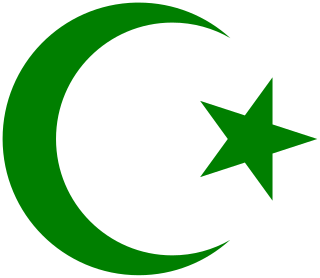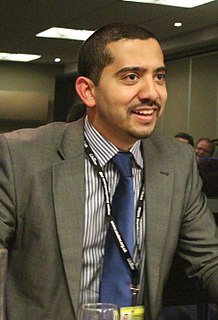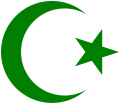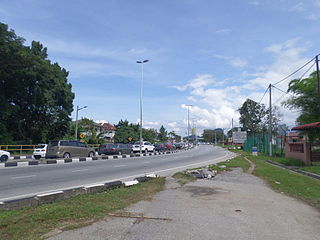
Human rights in Saudi Arabia are the subject of protection or violation by the government, which enforces Wahhabi religious laws under absolute rule of the Saudi royal family.

Laskar Jihad, was an Islamist and anti-Christian Indonesian militia, which was founded and led by Jafar Umar Thalib. At present, the militia is believed to have disbanded.

Nahdlatul Ulama is a traditionalist Sunni Islam movement in Indonesia following the Shafi'i school of jurisprudence. NU was established on January 31, 1926 in Surabaya as a response to the rise of Wahabism in Saudi Arabia and Islamic modernism in Indonesia. The NU is the largest independent Islamic organization in the world with membership estimates ranging from 40 million (2013) to over 90 million (2019). NU also is a charitable body funding schools and hospitals as well as organizing communities to help alleviate poverty.

Islam is the most adhered to religion in Indonesia, with 87.2% of Indonesian population identifying themselves as Muslim in 2010 estimate. Indonesia has the largest Muslim population in the world, with approximately 225 million Muslims.
Hidayatullah is an Islamic mass organization based in Indonesia, founded in 1973. It is aimed at propagation of puritanical interpretation of Islam, and dawah (proselytization). The organization operates pesantren, mass media, women's division, and coop.

Mehdi Raza Hasan is a British political journalist, broadcaster and author.

Syarif Hidayatullah State Islamic University Jakarta is a public university in Indonesia. It is in Ciputat, South Tangerang, Banten, district in southern Jakarta.
Lembaga Dakwah Islam Indonesia or LDII, is an independent social organization for study and research on Alqur'an and Alhadist. Dakwah is Indonesian for religious proselytizing.
The Masyumi Party was a major Islamic political party in Indonesia during the Liberal Democracy Era in Indonesia. It was banned in 1960 by President Sukarno for supporting the PRRI rebellion.

Muhammad Rizieq Shihab also known as Habib Rizieq is an Indonesian Islamist scholar, the founder and leader of the Islamist group Islamic Defenders Front. He currently resides in Riyadh, Saudi Arabia.

LIPIA is an educational institution established in Jakarta. The college is a branch of the Imam Muhammad ibn Saud Islamic University in Riyadh, Saudi Arabia. The main purpose is to teach Arabic and Islam. The college also teaches Wahhabi Madhab, a branch of Salafi.

Ismail ibn Musa Menk, also known as Mufti Menk, is a Muslim cleric and Grand Mufti of Zimbabwe. He is identified as a Salafi. He is the head of the fatwa department of The Council of Islamic Scholars of Zimbabwe.

Al-Azhar Great Mosque is a mosque located in Jalan Sisingamangaraja, Kebayoran Baru, Jakarta. The mosque was constructed between 1953 and 1958. It was originally known simply as Mesjid Agung. It was Jakarta's largest mosque when it was built until it was surpassed by the Istiqlal Mosque which was completed in 1978. Al-Azhar mosque and the mosque complex is best known for its educational works.

Islam Nusantara or Indonesian (Islamic) model is a distinctive brand of Islam developed in Nusantara at least since the 16th century, as a result of interaction, contextualization, indigenization, interpretation and vernacularization of universal Islamic values, according to socio-cultural reality of Indonesia. The term was first officially coined, proposed and promoted by Indonesian Islamic organization Nahdlatul Ulama in 2015, as an alternative for interpretation and representation of global Islam that currently dominated by Arabic or Middle Eastern perspectives.

Abdul Somad Batubara is an Indonesian Islamic preacher and ulama from Asahan, North Sumatra. He is known for his lectures on various religious issues, especially regarding hadith studies and Islamic jurisprudence. In addition, he often discusses trending topics in the Muslim community and society, such as nationalism. His dawah and lectures are characterized by unique rhetoric and humor that attract layman as well, and often broadcast through the YouTube channel and other social media. He is currently also serving as a lecturer at the Sultan Syarif Kasim II State Islamic University in Riau. In addition to his lecture, he authors several books, among them are translations of Arabic publications, and religious guides regarding individual subjects such as qurbani and salah.
Campus Dakwah Institute, often abbreviated as LDK, is an inter-campus student organization linking every university in Indonesia, aimed for the proselytization of Islam (dawah). Most of the universities in Indonesia is required to have their LDK branch. In each campus, the LDK branch can be different in its organization, in which different names are often employed, including Unit Kegiatan Mahasiswa Islam, Islamic Spirituality, Islamic Studies Forum, and Islamic Spiritual Body.

Islam is the most adhered religion in West Sumatra, a province of Indonesia, embraced by 97.42% of the whole population. The percentage of Muslim population increases to 99.6% if excludes the Mentawai Islands, where the majority of the non-Muslim (Protestant) West Sumatrans reside. Denomination among Islam in West Sumatra is predominantly Sunni Islam, and there is a small Shia Islamic pocket within the coastal city of Pariaman. Minangkabau people who are indigenous to West Sumatra and consist 88% of West Sumatran population today have historically played the important role within the Muslim community in Indonesia. Up until today the region is considered as one of the strongholds of Islam in Indonesia.
Jemaah Tarbiyah, also known as the Tarbiyah movement or the Dakwah movement, is an Islamic religious movement based in Indonesia. Jemaah Tarbiyah was an active movement during the 1980s to 1990s and consisted of university students, aimed at the religious education and da'wah (proselytizing). The movement is considered to be influenced by the teaching of Muslim Brotherhood. It is considered an important influence for Islamization of Indonesia. The movement became the bedrock of the Islamist party Prosperous Justice Party (PKS) which was founded in 2002.
Modernism or modernist Islam, in the context of Muslim society in Indonesia, refers to a religious strand which puts emphasis on teachings purely derived from the Islamic religious scriptures, the Qur'an and Hadith. Modernism is often contrasted with traditionalism, which upholds ulama-based and syncretic vernacular traditions. Modernism is inspired by reformism in the late-19th to early 20th century based in the Middle East, such as Islamic modernism and Wahhabism. Throughout the history of contemporary Muslim Indonesia, modernism has spawned various religious organizations, from mass organization Muhammadiyah (1912), political party Masyumi Party (1943), to missionary organization Indonesian Islamic Dawah Council (1967).




















